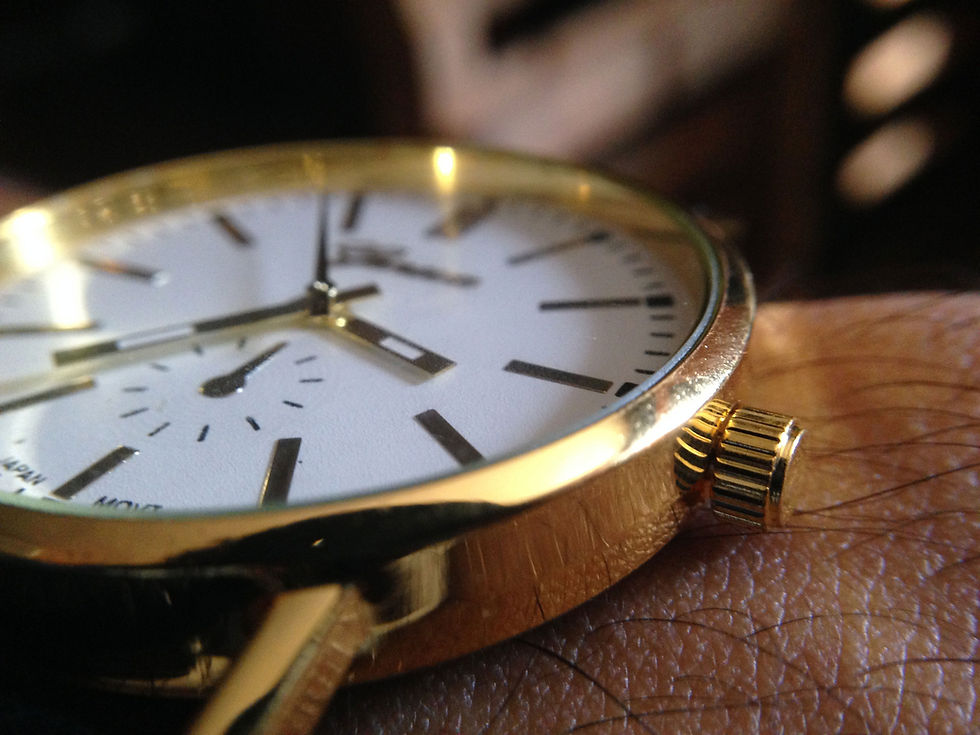Time is Not On My Side

What are you really great at? I mean, if I asked you what your strong suit is, what would it be? For the majority of my life, my most positive attribute was my ability to manage my time. At one point in my life, I was working an arduous full-time job with long hours, going to grad school full-time to study for my MBA, and I still found time to run at least one marathon a year. How did I do it all? Mornings. No, I’m not a morning person. I hate waking up in the morning. My husband is a morning person. He is obnoxious. He’s bright eyed, bushy-tailed, and so chipper I’m surprised our marriage has survived the entire ordeal. I, on the other hand, hit snooze 2-3 times and have been accused of near violence before having my coffee. I still always woke up at 4:00 am. I aways woke up early because I knew that was the only time of the day that was exclusively mine. It’s time I did not share with anyone, not my husband, not my boss, colleagues, or employees, not friends nor family. I could do whatever I wanted between 4:00 am and 8:00 am and no one would interrupt me. It’s when I studied, did my leisure reading, exercised, or sometimes just sat outside with a cup of coffee enjoying the morning weather. No one ever interrupts your day before 8:00 am. After that point, it’s all up in the air, anything can happen. The boss can ask you to work late, your lunch break could become a meeting, your 8-hour workday can become 12, or your friends can invite you to that happy hour you’ve been wanting to schedule. This was my secret. This is why I excelled at time management. Unfortunately, time is no longer on my side. This isn’t always true. I’m currently in remission, symptom-free remission as a matter of fact, and this means that I can wake up in the morning and the only thing in my way is my own anxiety over possibly having GI issues THAT morning. It’s the mornings when I’m experiencing a flare or still experiencing symptoms despite being in remission that I lose all my time. If someone asks me what the worst parts are of having Crohn’s disease, they are always surprised to hear me say it’s time consuming. My fellow IBD warriors know. Many of us wake up at 4:00 am, not because we want to enjoy our personal time, but because we are trying to get through our morning GI issues so we can go to work. IBD is an interesting disease. If I sleep in until 8:00, my personal bathroom time starts at 8:00 and ends around 11:00. If I wake up at 4:00 am, my personal bathroom time starts at 4:00 and ends around 7:00. I just need to pick what part of the day I want to waste (haha. A pun) on my Crohn’s disease. This is the loss I most mourn since being diagnosed with Crohn’s disease. I find myself having to prioritize what I can get done during the day based upon how many hours I need to take care of CB (Crohn’s business) before starting my day if I’m even well enough to do anything beyond that CB time. That means I may not be able to exercise, or read my book, or even just relax for 30 minutes because I had to spend my leisure time in a bathroom. If I’m in a flare, my day is done no matter what. This is the loss that often hurts the most. The chronically ill and disabled just want to be able to do what everyone else does and not having that time reminds me of my limitations. This certainly affects my mental health and I know it does most IBD patients. This is why getting into symptom-free remission is so important. It’s also why “fail first” step therapy is so detrimental to patients. Fail first is a process implemented by insurers that overrules doctor recommendations and requires a patient to “fail first” at an insurer preferred (cheaper) treatment before stepping up to the next insurer preferred treatment. This often means weeks, months, years of physical pain, mental anguish, inability to work, and even possibly death. I know advocating for new bills isn’t everyone’s favorite thing to do but if you suffer from a chronic disease or love someone who does, please call your Senator, and ask them to support the Safe Step Act. We all deserve dignity in our health care. We deserve to have time on our side.
Comentarios